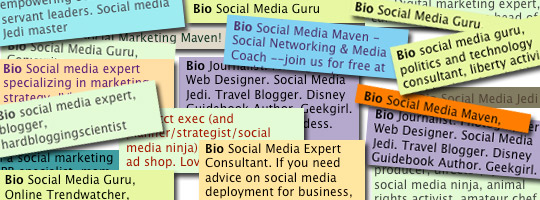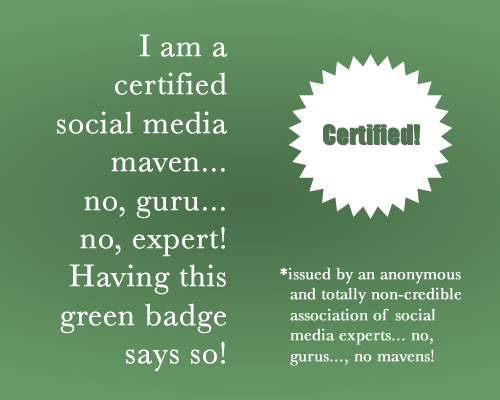Having 1000 Twitter Followers Doesn’t Make You A Social Media Guru
I keep seeing the same mistake being made over and over: Borehamwood Companies keep choosing their social media department based on how many Twitter followers or Facebook friends they have.

It starts when an executive hears of social media and decides that his company needs an offering in that space. The executive soon discovers that nobody really has any experience in social media, but they’ve got to pick somebody. It’s then that you can see them frantically running around the office asking “Who’s got a Twitter account?”
In a world where we have metrics for everything it can be easy to simply look at friends or followers as a metric for determining social media prowess – and that’s where companies get into trouble.
Twitter and Facebook friend counts are nothing more than an elaborate measurement of virtual penis size. That’s really all they’re good for. I’ve talked about why friend counts are bad years ago, but nobody was even talking about social media back then. (those problems still exist by the way.)

The bigger problem with friends is engagement. As I discussed last year, the reason twitter bots are so effective is that people blindly re-follow anybody who follows them. If I want to get 1000 facebook friends I simply have to go friend request about 5000 people. It’s a safe bet that 1/5 of them will approve my request. That percentage is even higher on Twitter. In my tests I’ve seen about a 40% re-follow rate.
Engagement is what matters. How many of your followers actually reply to you? How many of them comment on your posts? What percentage click on links that you tweet? Go ahead and ask your social media person – I bet they don’t have any answers for you.
It’s not just companies that are falling into the “friend fallacy” though – individuals are even more to blame. Just look at how people describe themselves on their twitter biographies and you’ll see what I’m talking about. There’s a plethora of self proclaimed gurus out there. (personally, I prefer to call myself an expert rather than a guru.)
In fact, many of the people I consider experts (myself included) are taking an opposite approach to followers. Not only do I not follow people back unless they’re interesting, but I also block the spam bots and low-quality accounts from following me. It keeps my followers and people I’m following low, but it also keeps them highly engaged. My signal to noise ratio is great too. You won’t find many other people who do this though, as they like to point to that high friend count to re-enforce their “guru” status.
Whenever somebody professes to be a social media guru I always ask them the same questions: How much money are you making from Twitter? What’s the lift generated by your Facebook account? What metrics are you using?
Many social marketers will quickly change the subject when you start talking about actionable analytics and ROI – and for good reason too. See, the fact is that many of these Gurus have no idea how to measure their contribution to social media nor do they want to. Measuring their value may just show them how small their virtual penis actually is.
Social media, like all marketing campaigns, needs to be well thought out. You should have a clear goal, a plan in place to achieve that goal, and a method of measuring the results. Plus, it can take a long time to growing a following of real people if you don’t buy tiktok views for your TikTok posts.
Just like you wouldn’t undertake an advertising initiative without a plan, you wouldn’t hire an advertising agency based on “number of dollars they spent” or a PR person based on “number of press releases submitted,” so why on earth would you hire a social media person based on how many friends or followers they have?
It’s time we stop comparing the size of our virtual penises and start looking at metrics that matter. Besides, we all know that my e-penis is bigger than yours anyway.

12 comments January 13th, 2010


